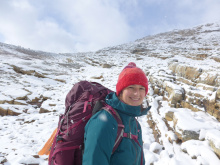The Problem of Time in Climate Change Ecology

Elizabeth Wolkovitch
Biodiversity Research Center, University of British Columbia, Canada
Link to seminar:
https://umontpellier-fr.zoom.us/webinar/register/WN_WqfnjUAORei_iyyQt6YFBw
Forty years ago ecology became increasingly focused on spatial structure and pattern, as researchers realized how fundamentally habitat loss and fragmentation reshapes populations and communities. A generation later, with spatial ecology firmly established as a cross-disciplinary, multi-scale field, anthropogenic climate change has forced ecology to revisit the importance of time. As warming stretches growing seasons around the globe, populations, species, communities and ecosystems are responding in turn.
In this talk I outline two major challenges of temporal ecology with anthropogenic warming: stretched time and accelerated time. Focusing on plant phenology I show how longer growing seasons may re-assemble communities: first I focus on examples from invasion biology then I build to a more general theory. Next I show how how warming may make many biological processes that are dependent on thresholds appear to slow as warming continues. This is because warming accelerates biological time while calendar time stands still. I close by reviewing preliminary results that merge phenological cues with trait ecology to show that forests may assemble via their spring phenology.
Isabelle Chuine (CEFE) isabelle.chuine@cefe.cnrs.fr


